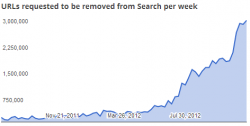Weekly News Roundup (February 26, 2017)
Welcome to another edition of the WNR. As there’s no Valentine’s Day this week, we actually have a bit of news to go through. Just a bit though, not too much.
So without further ado, let’s get at it!
![]()
It’s been coming, and with the government putting on so much pressure (after itself receiving pressure from rights-holders), Google and Bing have signed up to a “voluntary” code of ethics that will see pirate search results demoted in the UK.
But wait a second, you ask, doesn’t Google already do this? They do, but apparently under the new agreement, things will be “intensified”, whatever that means. The one thing that isn’t included in the agreement is de-listing, the process of completely removing all references to a site from Google/Bing. Although with sufficient demotion, results may be shifted to page 2 and beyond, and the amount of traffic that will filter through will be insignificant.
But piracy sites, especially the big ones, already argue that the traffic they get from Google (let alone Bing) is already fairly insignificant, and most of their traffic is direct traffic, that is people typing the domain name directly into their browser. Of course, with site blocking also being implemented in the UK, rights-holders are also seeking to affect direct traffic for anyone not using a VPN or a proxy.
So there might yet be some success in reducing access to piracy sites, and that will lead to a reduction in pirated downloads. But will this actually help the film and music industry in any perceivable way, especially when it comes to the bottom line? Don’t bet on it!
So while piracy may be on the decline in the UK, the number of pirated content may be on the rise in the U.S., thanks ironically, to an over-enthusiastic anti-piracy firm. A Brazilian based anti-piracy outfit has filed more than 45 million URL take-down requests to Google for a MP3 site that receives almost no traffic, and where most of the pages on the site were created by the same Brazilian anti-piracy outfit in the first place.

There’s a new way for rights-holders to find new pages to remove on Google – by creating your own piracy pages!
So basically Brazilian anti-piracy outfit APDIF decided to lob song related search terms at MP3Toys’ search page. The search page dynamically generates content based on the search term, which means it’s APDIF’s efforts that actually creates the page and its contents. APDIF then submits the page to Google for removal, even though it was never indexed by Google in the first place (and didn’t even exist before APDIF made it exist). Repeat at least 45 million times.
Also, it has a Schrodinger’s Cat feel to it, doesn’t it? Schrodinger’s Piracy Page?
I also suspect someone has been charging rights-holders on a “per piracy page found and removed” basis, and found a way to easily make an endless amount of money.
Speaking of making money, it appears that when it comes to Japanese comics, sometimes piracy can help to increase revenue. The research found that piracy does hurt sales when it came to on-going comic books, but for completed sets, piracy can actually help to promote these sets and increase sales. Who would have thought?
======
Righto, that’s it for this week. Sorry it’s a bit bland in that it was all copyright news, but what can you do? See you next week!

